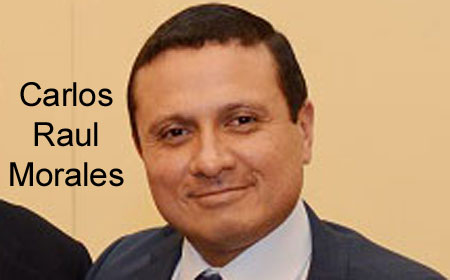BELIZE CITY, Thurs. Jan. 5, 2017–Guatemalan Foreign Minister Carlos Raúl Morales continues to press for a formal vote by both Belize and Guatemala to have the territorial differendum between the countries adjudicated by the International Court of Justice (ICJ), based on an agreement signed 8 years ago in Washington, D.C.
That agreement states that the question of whether the matter will go to the ICJ could only be answered by national referenda held in the respective countries.
The vote, originally scheduled for October 2013, was aborted and Guatemala’s then president, Otto Perez Molina, pressured Belize to change its Referendum Act, which requires a minimum voter turnout to validate the poll, to remove that requirement, as he argued that the provision was not conducive to a ‘yes’ vote.
At the time, Belizean officials, including Prime Minister Dean Barrow, stood vehemently opposed to appeasing the Molina administration, but on December 9, 2016, amendments were tabled in Parliament to dispense with the minimum voter turnout requirement, although Barrow had previously signaled that the quid pro quo would be progress in bilateral relations at the Sarstoon – Belize’s southern border with Guatemala, where Guatemala’s military have claimed that Belizean military require special permission to use the river, although the border runs along the river’s mid-channel.
Although Belize authorities were hoping for a formal Sarstoon mechanism to be agreed by the end of 2016, no such agreement was reached and instead, it was revealed that more than a decade ago, Guatemala had sneaked fishing regulations onto its law books which encapsulate as many as 100 square miles of Belize’s maritime territory, up to the coast of Punta Gorda, Toledo.
In the face of these developments, Morales has signaled to the Guatemala press that Belize has changed its referendum law—although our information is that the amendments, tabled in Belize’s Parliament a month ago, were discussed in the House Committee just today and they won’t go back for passage by the House of Representatives until the next meeting of the House, scheduled for Friday, January 13.
We were told that the Embassy of Guatemala in Belize had contacted the National Assembly to find out the status of the legislative change, and they had been advised that the publication of the proposed amendment in the Government’s Gazette did not mean that it was already passed by Parliament.
In a news report appearing online, Morales was quoted as saying at a press conference that last Thursday, he was notified of the approval of the amendment by Belize’s Parliament, paving the way for the overdue referenda on the ICJ. Morales said that with the legislative change in Belize, both countries would conduct the vote with the same laws and conditions.
Morales also issued a call to all sectors in Guatemala to make it “a state issue” to find quick solutions.
Amandala is informed that the House intends to pass the amendment to Belize’s Referendum Act—which reportedly drew no objections from the Opposition People’s United Party in today’s committee meeting—at its sitting next week.

